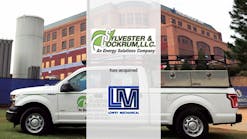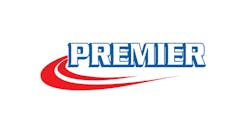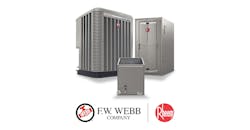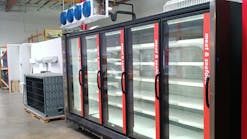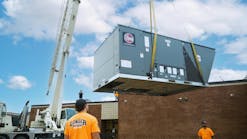Contracting in the educational sector is quite different from the private sector — from the bidding process and additional security measures to the complex scheduling. Atlantic Westchester has more than 30 years of experience in this area and the knowledge and expertise needed to navigate through the public sector and successfully complete jobs for school district buildings.
Atlantic Westchester became heavily involved in school HVAC services through an opportunity to provide temperature control services. In the early 1990s, many school district buildings began a conversion to electronic building management systems and several major manufacturers that had been providing this service shifted their focus to new electronic technology. This shift in the market presented an opportunity for our company to service legacy pneumatic control systems. This allowed us to form service relationships and to provide all related HVAC system maintenance, service and upgrades in a local vertical market.
Our company became involved at the beginning of the school mechanical system retrofit cycle in our market area, following the energy crunch from the 1970s and economic challenges from the 1980s. That cycle was spearheaded by improved building ventilation and equipment replacement, repairs and upgrades that helped expose us to current building code regulation and compliance for publicly occupied spaces. Additionally, we learned about energy performance contracting, as well as other applications, in schools whether we were directly involved, consulted, finished or remediated projects started by others.
Since the educational sector is an important vertical market for us at Atlantic Westchester, all of our employees are trained to work in school buildings and are made aware of the nuances and rules. It’s a constantly evolving process that requires a lot of communication between the client, our office and the field.
Since the educational sector is an important vertical market for us at Atlantic Westchester, all of our employees are trained to work in school buildings and are made aware of the nuances and rules. It’s a constantly evolving process that requires a lot of communication between the client, our office and the field.
What Are Schools Looking For?
Many of our clients are seeking HVAC systems that perform efficiently and reliably, without large expensive surprises. Unfortunately, that is not always the case, since there is a wide range of technology, building age and condition and other factors that come into play. Many school districts are faced with financial constraints that prevent them from staying ahead of the curve on the physical plant equipment and condition. We work on components and systems that range from brand new to more than 40 plus years old. As a result, there have been several energy performance contract upgrades in the past 10 years that have been a creative way for districts to upgrade facilities through shared energy savings such as electronic controls, new boilers, higher efficient HVAC equipment, roofs, windows, and other items.
Our company is based in Westchester County, NY, which is the highest taxed county in the US. Therefore, it’s not easy to get the public to approve infrastructure improvement spending. Additionally, proper maintenance has been proven to help extend system and equipment lifespan, so it’s a part of our standard pitch to provide proactive HVAC maintenance.
Maintenance scheduling is tricky due to occupancy, but we work out access with building personnel based on system type, design and access.
Before jumping into the educational sector, it’s worth evaluating, learning about and preparing for the challenges that are unique to this sector.
Scheduling Challenge
Anytime a school building is closed to students is a great time to perform work. Summer, as well as holiday breaks, is when we typically perform work that involves a system interruption. Maintenance scheduling is tricky due to occupancy, but we work out access with building personnel based on system type, design and access. We try to avoid overtime expenses, if possible.
Security Challenge
Unfortunately, because of the threat of invasion that every school must consider, building access has become a very serious concern. All of our employees who visit a school building need to have proper identification and must check in with the onsite security personnel. Oftentimes, we need to present our driver’s license and wait for clearance once the information is checked to ensure that there isn’t a threat to the safety and welfare of the occupants. We are then escorted instead of being given keys, even if we are familiar with where we are going.
Schools require advance notice, so they know to expect a visit whether it’s for routine maintenance or emergency service. There’s a lot of coordination that must take place before a contractor can arrive.
Additionally, schools require advance notice, so they know to expect a visit whether it’s for routine maintenance or emergency service. There’s a lot of coordination that must take place before a contractor can arrive. Contractors are also expected to follow building regulations if there is a fire or safety drill. Moreover, we must be careful if we take photographs, so that we don’t include any students in our pictures. Typically, we ask for permission from authorized personnel first before we take any pictures.
The Bidding Process Challenge
When beginning to dip your toe into the educational sector, it is important to know that schools, and publicly owned facilities in New York, must follow municipal bidding regulations which is a learning curve on its own. Bonding, insurance, prevailing wages, safety training, background checks and building access issues are a few things that need to be learned, so that a contractor considering this segment can do proper estimating.
Another nuance to the bidding process is that the lowest bidder is usually not the cheapest cost. Pricing starts at the design team and goes all the way through to the installer. Since schools own their facilities, it has always been my observation that the lowest “qualified” bidder is better than the lowest price. I have seen several construction projects gone awry that have presented opportunities for remediation and unfortunately the long-term expenses are far greater than if the design and/or work was done properly from the beginning. The same is true for service and maintenance. I often use the analogy that if
a building just bought an HVAC system equivalent to the cost of a new Bentley, then why are they looking for the least expensive mechanic to provide competent maintenance and repairs? Do they
expect that the cheap solution will yield the best results? Unfortunately, due to state bidding laws, agencies are often forced to follow a broken system. The good news is that Atlantic Westchester is here to fix it!
Bud Hammer is President, Atlantic Westchester, Inc., a commercial and industrial HVAC and energy efficiency company located in Bedford Hills, NY. Atlantic Westchester offers a variety of commercial and industrial HVAC solutions for businesses, institutions and government facilities across the NY metro area. For additional information, visit atlanticwestchester.com.


